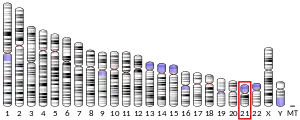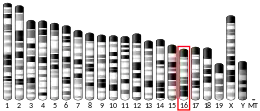HMGN1
Non-histone chromosomal protein HMG-14 is a protein that in humans is encoded by the HMGN1 gene.[5][6][7]
Function
Chromosomal protein HMG14 and its close analog HMG17 (MIM 163910) bind to the inner side of the nucleosomal DNA, potentially altering the interaction between the DNA and the histone octamer. The 2 proteins may be involved in the process that maintains transcribable genes in a unique chromatin conformation.[8] Their ubiquitous distribution and relative abundance, as well as the high evolutionary conservation of the DNA-binding domain of the HMG14 family of proteins, suggest that they may be involved in an important cellular function.[7]
References
- GRCh38: Ensembl release 89: ENSG00000205581 - Ensembl, May 2017
- GRCm38: Ensembl release 89: ENSMUSG00000040681 - Ensembl, May 2017
- "Human PubMed Reference:". National Center for Biotechnology Information, U.S. National Library of Medicine.
- "Mouse PubMed Reference:". National Center for Biotechnology Information, U.S. National Library of Medicine.
- Landsman D, Srikantha T, Westermann R, Bustin M (Dec 1986). "Chromosomal protein HMG-14. Complete human cDNA sequence and evidence for a multigene family". The Journal of Biological Chemistry. 261 (34): 16082–6. doi:10.1016/S0021-9258(18)66680-3. PMID 3782107.
- Landsman D, McBride OW, Soares N, Crippa MP, Srikantha T, Bustin M (Feb 1989). "Chromosomal protein HMG-14. Identification, characterization, and chromosome localization of a functional gene from the large human multigene family". The Journal of Biological Chemistry. 264 (6): 3421–7. doi:10.1016/S0021-9258(18)94084-6. PMID 2563381.
- "Entrez Gene: HMGN1 high-mobility group nucleosome binding domain 1".
- Martínez de Paz A, Ausió J (2016). "HMGNs: The enhancer charmers". BioEssays. 38 (3): 226–31. doi:10.1002/bies.201500157. PMID 26709929. S2CID 24768724.
- Prymakowska-Bosak M, Hock R, Catez F, Lim JH, Birger Y, Shirakawa H, Lee K, Bustin M (Oct 2002). "Mitotic phosphorylation of chromosomal protein HMGN1 inhibits nuclear import and promotes interaction with 14.3.3 proteins". Molecular and Cellular Biology. 22 (19): 6809–19. doi:10.1128/MCB.22.19.6809-6819.2002. PMC 134047. PMID 12215538.
Further reading
- Pash J, Popescu N, Matocha M, Rapoport S, Bustin M (May 1990). "Chromosomal protein HMG-14 gene maps to the Down syndrome region of human chromosome 21 and is overexpressed in mouse trisomy 16". Proceedings of the National Academy of Sciences of the United States of America. 87 (10): 3836–40. Bibcode:1990PNAS...87.3836P. doi:10.1073/pnas.87.10.3836. PMC 53998. PMID 2140193.
- Leffak M, Trempe JP (Jul 1985). "Histone H1 and HMG 14/17 are deposited nonrandomly in the nucleus". Nucleic Acids Research. 13 (13): 4853–69. doi:10.1093/nar/13.13.4853. PMC 321831. PMID 4022776.
- Postnikov YV, Trieschmann L, Rickers A, Bustin M (Sep 1995). "Homodimers of chromosomal proteins HMG-14 and HMG-17 in nucleosome cores". Journal of Molecular Biology. 252 (4): 423–32. doi:10.1006/jmbi.1995.0508. PMID 7563062.
- Ding HF, Rimsky S, Batson SC, Bustin M, Hansen U (Aug 1994). "Stimulation of RNA polymerase II elongation by chromosomal protein HMG-14". Science. 265 (5173): 796–9. Bibcode:1994Sci...265..796D. doi:10.1126/science.8047885. PMID 8047885.
- Pash JM, Alfonso PJ, Bustin M (Jun 1993). "Aberrant expression of high mobility group chromosomal protein 14 affects cellular differentiation". The Journal of Biological Chemistry. 268 (18): 13632–8. doi:10.1016/S0021-9258(19)38695-8. PMID 8514795.
- Bustin M, Alfonso PJ, Pash JM, Ward JM, Gearhart JD, Reeves RH (Dec 1995). "Characterization of transgenic mice with an increased content of chromosomal protein HMG-14 in their chromatin". DNA and Cell Biology. 14 (12): 997–1005. doi:10.1089/dna.1995.14.997. PMID 8534374.
- Hock R, Scheer U, Bustin M (Dec 1998). "Chromosomal proteins HMG-14 and HMG-17 are released from mitotic chromosomes and imported into the nucleus by active transport". The Journal of Cell Biology. 143 (6): 1427–36. doi:10.1083/jcb.143.6.1427. PMC 2132996. PMID 9852141.
- Louie DF, Gloor KK, Galasinski SC, Resing KA, Ahn NG (Jan 2000). "Phosphorylation and subcellular redistribution of high mobility group proteins 14 and 17, analyzed by mass spectrometry". Protein Science. 9 (1): 170–9. doi:10.1110/ps.9.1.170. PMC 2144438. PMID 10739259.
- Bergel M, Herrera JE, Thatcher BJ, Prymakowska-Bosak M, Vassilev A, Nakatani Y, Martin B, Bustin M (Apr 2000). "Acetylation of novel sites in the nucleosomal binding domain of chromosomal protein HMG-14 by p300 alters its interaction with nucleosomes". The Journal of Biological Chemistry. 275 (15): 11514–20. doi:10.1074/jbc.275.15.11514. PMID 10753971.
- Prymakowska-Bosak M, Misteli T, Herrera JE, Shirakawa H, Birger Y, Garfield S, Bustin M (Aug 2001). "Mitotic phosphorylation prevents the binding of HMGN proteins to chromatin". Molecular and Cellular Biology. 21 (15): 5169–78. doi:10.1128/MCB.21.15.5169-5178.2001. PMC 87241. PMID 11438671.
- Prymakowska-Bosak M, Hock R, Catez F, Lim JH, Birger Y, Shirakawa H, Lee K, Bustin M (Oct 2002). "Mitotic phosphorylation of chromosomal protein HMGN1 inhibits nuclear import and promotes interaction with 14.3.3 proteins". Molecular and Cellular Biology. 22 (19): 6809–19. doi:10.1128/MCB.22.19.6809-6819.2002. PMC 134047. PMID 12215538.
- Soloaga A, Thomson S, Wiggin GR, Rampersaud N, Dyson MH, Hazzalin CA, Mahadevan LC, Arthur JS (Jun 2003). "MSK2 and MSK1 mediate the mitogen- and stress-induced phosphorylation of histone H3 and HMG-14". The EMBO Journal. 22 (11): 2788–97. doi:10.1093/emboj/cdg273. PMC 156769. PMID 12773393.
- Zou Y, Jiang X, Wang Y (May 2004). "Identification of novel in vivo phosphorylation sites in high mobility group N1 protein from the MCF-7 human breast cancer cells". Biochemistry. 43 (20): 6322–9. doi:10.1021/bi0362828. PMID 15147216.
- Beausoleil SA, Jedrychowski M, Schwartz D, Elias JE, Villén J, Li J, Cohn MA, Cantley LC, Gygi SP (Aug 2004). "Large-scale characterization of HeLa cell nuclear phosphoproteins". Proceedings of the National Academy of Sciences of the United States of America. 101 (33): 12130–5. Bibcode:2004PNAS..10112130B. doi:10.1073/pnas.0404720101. PMC 514446. PMID 15302935.
This article is issued from Wikipedia. The text is licensed under Creative Commons - Attribution - Sharealike. Additional terms may apply for the media files.



